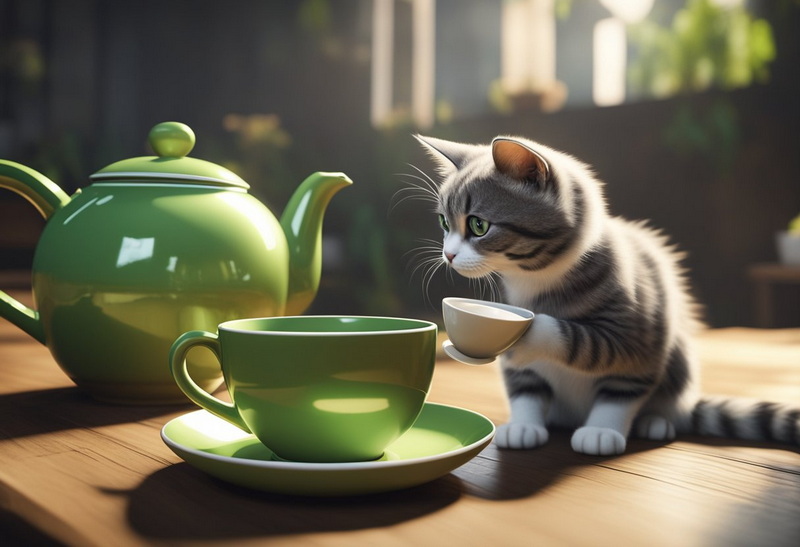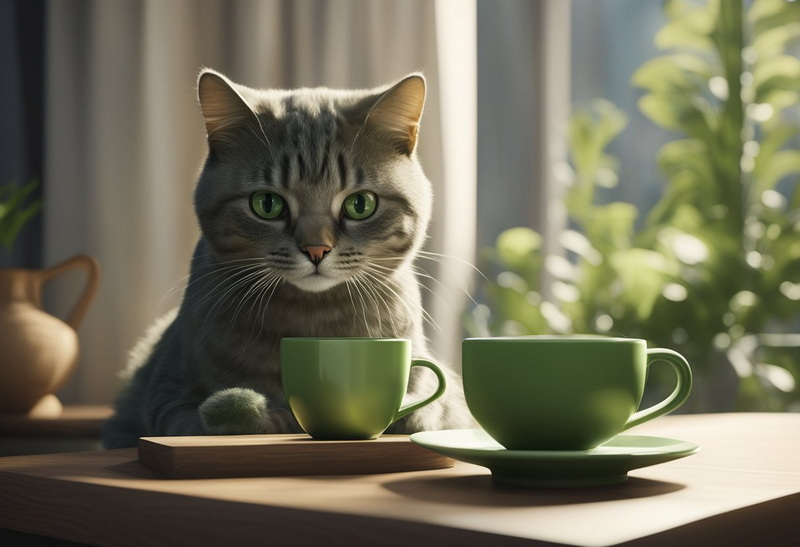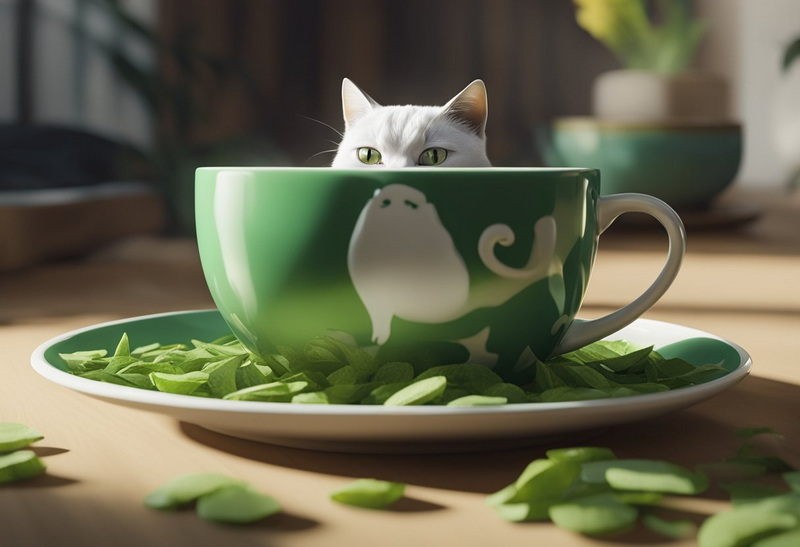Content Menu
● The Power of EGCG
● Potential Benefits of Green Tea for Cats
● Risks and Considerations
● How to Safely Introduce Green Tea to Your Cat
● Green Tea Extract in Cat Food
● Conclusion
● FAQ
>> 1. Can kittens drink green tea?
>> 2. What are the symptoms of caffeine poisoning in cats?
>> 3. Can green tea cure dental disease in cats?
>> 4. Is matcha safe for cats?
>> 5. Can I add green tea extract to my cat's water bowl?
● Citations:
Green tea extract is a concentrated form of green tea, containing a higher concentration of its active compounds[2]. These compounds, primarily polyphenols like Epigallocatechin-3-gallate (EGCG), are known for their antioxidant and anti-inflammatory properties[2]. Green tea extract is available in various forms, including liquids, powders, and capsules, and is often marketed as a dietary supplement for humans[2].

The Power of EGCG
Epigallocatechin-3-gallate (EGCG) constitutes up to 45% of green tea's composition and is a potent antioxidant that reduces free radicals in the body[2]. It not only reduces tumor growth but also significantly boosts the skin's defense against UVB radiation and can even destroy cancer cells[2].
Potential Benefits of Green Tea for Cats
While research on green tea extract in cats is limited, some studies and anecdotal evidence suggest potential benefits:
1. Antioxidant Properties: Green tea is rich in antioxidants, which can help protect cells from damage caused by free radicals[4]. This may contribute to overall health and potentially reduce the risk of chronic diseases[4].
2. Oral Health: Green tea catechins can inhibit bacterial growth in the oral cavity, reducing bad breath and improving oral hygiene in cats[4]. Studies have shown that green tea extract can reduce the gingival index and methylmercaptan concentrations in cats, indicating improved periodontal health[1].
3. Cognitive Function: L-theanine, an amino acid found in green tea, may improve brain function and cognition in cats[4]. This could be particularly beneficial for aging cats, potentially reducing the risk of dementia and cognitive decline[4].
4. Weight Management: Green tea may help improve metabolism and support weight loss in overweight cats[4]. Some research suggests that green tea consumption can promote fat burning and reduce fat accumulation around the mid-section[4].
5. Hydration: Green tea can be a flavorful way to increase a cat's fluid intake, especially for those who primarily eat dry food and may not drink enough water[4]. Adequate hydration is essential for preventing urinary issues like struvite crystals and kidney stones[4].
6. Reduce Viral Proliferation: Green tea extract can reduce viral proliferation and ROS production during Feline Herpesvirus type-1 (FHV-1) infection[3].
Risks and Considerations
Despite the potential benefits, there are also risks and considerations associated with giving green tea extract to cats:
1. Caffeine Content: Green tea contains caffeine, which can be toxic to cats in high doses[4]. Symptoms of caffeine poisoning in cats include restlessness, hyperactivity, increased heart rate, and, in severe cases, seizures or death[7]. It is crucial to use decaffeinated green tea or carefully monitor the amount of caffeinated tea given to your cat[2].
2. Green Tea Extract Concentration: Green tea extract contains concentrated amounts of minerals, vitamins, and caffeine that have not been properly tested for cats. Do not give cats green tea extract![2]
3. Digestive Issues: Some cats may experience digestive upset, such as vomiting or diarrhea, after consuming green tea[4]. Start with a small amount and monitor your cat for any adverse reactions[4].
4. Individual Sensitivity: Cats can have individual sensitivities or allergies to green tea[4]. If your cat has a known allergy to plants in the *Camellia* family, avoid giving them green tea[4].
5. Drug Interactions: Green tea may interact with certain medications[4]. Consult with your veterinarian if your cat is taking any medications before introducing green tea into their diet[4].

How to Safely Introduce Green Tea to Your Cat
If you decide to offer green tea to your cat, follow these guidelines to minimize potential risks:
1. Consult Your Veterinarian: Before giving your cat green tea, talk to your veterinarian[4]. They can assess your cat's individual health needs and determine if green tea is appropriate[4].
2. Choose Decaffeinated Green Tea: Opt for decaffeinated green tea to minimize the risk of caffeine toxicity[2].
3. Brew and Cool the Tea: Brew the green tea using hot water (around 160-170°F) for 2-3 minutes[6]. Allow the tea to cool completely before offering it to your cat[6].
4. Dilute the Tea: Dilute the brewed tea with water before serving it to your cat[6]. A teaspoon or two of tea mixed with your cat's water is a good starting point[6].
5. Offer in Moderation: Green tea should be given in moderation[4]. Do not allow your cat to consume large quantities of green tea[4].
6. Monitor for Adverse Reactions: Observe your cat for any signs of adverse reactions, such as vomiting, diarrhea, or restlessness[6]. If you notice any concerning symptoms, discontinue use and consult your veterinarian[6].
Green Tea Extract in Cat Food
Some cat food manufacturers add green tea extract to their formulas, citing its potential oral health benefits[1]. If you choose a cat food containing green tea extract, research the brand carefully and select a reputable manufacturer[1]. Ensure that the product has undergone safety testing and that the green tea extract is present in a safe and appropriate amount for cats[1].
Conclusion
While green tea offers several potential health benefits for cats, including antioxidant properties, improved oral health, cognitive support, and weight management, it is essential to approach its use with caution. The caffeine content and potential for digestive upset or individual sensitivities should be carefully considered. Always consult with your veterinarian before introducing green tea into your cat's diet and follow the guidelines for safe preparation and administration.
By understanding the potential benefits and risks, you can make an informed decision about whether green tea is a suitable addition to your cat's health regimen.

FAQ
1. Can kittens drink green tea?
It is generally not recommended to give green tea to kittens[4]. Kittens are more sensitive to the effects of caffeine and may be more prone to digestive upset[4]. Always consult with your veterinarian before giving any supplements or alternative remedies to kittens[4].
2. What are the symptoms of caffeine poisoning in cats?
Symptoms of caffeine poisoning in cats include restlessness, hyperactivity, increased heart rate, vomiting, diarrhea, tremors, and seizures[7]. If you suspect your cat has consumed too much caffeine, seek immediate veterinary attention[7].
3. Can green tea cure dental disease in cats?
Green tea can help improve oral hygiene and reduce bad breath in cats, but it is not a substitute for professional dental care[4]. Regular dental cleanings and check-ups with your veterinarian are essential for preventing and treating dental disease[4].
4. Is matcha safe for cats?
Matcha is a type of green tea that comes in a powdered form[6]. It contains a higher concentration of caffeine than regular green tea, making it potentially more dangerous for cats[6]. It is best to avoid giving matcha to cats due to the increased risk of caffeine toxicity[6].
5. Can I add green tea extract to my cat's water bowl?
It is generally not recommended to add green tea extract to your cat's water bowl[2]. The concentration of green tea extract can be difficult to control, and some cats may not like the taste[2]. It is safer to brew and dilute green tea separately and offer it to your cat in moderation[2].
Citations:
[1] https://patents.google.com/patent/EP0951838A1/en
[2] https://purrfectlove.net/green-tea-benefits-for-cats/
[3] https://pubmed.ncbi.nlm.nih.gov/39175036/
[4] https://thehalopets.com/can-cats-drink-green-tea/
[5] https://www.researchgate.net/profile/Anton-Beynen/publication/340332969_Green-tea_extract_in_petfood/links/5e8414cba6fdcca789e5968e/Green-tea-extract-in-petfood.pdf
[6] https://chineseteas101.com/can-cats-drink-green-tea/
[7] https://vcahospitals.com/know-your-pet/black-and-green-tea
[8] https://vetexplainspets.com/is-green-tea-extract-safe-for-cats/






























